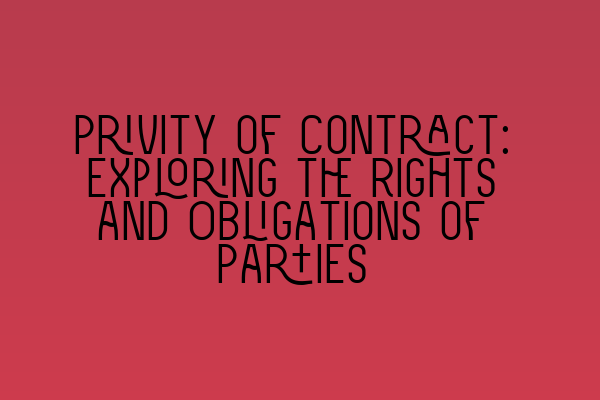Privity of Contract: Exploring the Rights and Obligations of Parties
In contract law, the concept of privity is an essential element that governs the rights and obligations of the parties involved. Understanding the intricacies of privity is crucial, as it determines who can enforce a contract and who is bound by its terms. In this blog post, we will delve into the depths of privity of contract, exploring its significance and implications.
Privity of contract refers to the legal relationship that exists exclusively between the parties who have entered into a contract. It establishes the principle that only those parties have the right to enforce the terms of the agreement and enjoy its benefits. This means that a third party, not directly involved in the contract, generally cannot enforce its terms nor be held liable for any breach.
One of the primary reasons for this limitation is the doctrine of privity’s connection to the concept of consideration, which refers to something of value that is exchanged between the contracting parties. Consideration is a critical element in the formation of a valid contract and serves as the basis for enforcing its terms. As such, a third party who has not provided consideration cannot claim any rights or liabilities under the contract.
However, it is important to note that there are exceptions to this general rule, which allow for the enforcement of contracts by certain third parties. These exceptions arise from statutory provisions, common law principles, and the intention of the parties themselves. Let’s explore some of the exceptions to the doctrine of privity:
1. Assignment of rights: Under the principle of assignment, a party to a contract can transfer their contractual rights to a third party. This enables the third party to enforce those rights against the other contracting party. For example, if Party A contracts with Party B to deliver goods, Party A can assign their right to receive payment to Party C, who can then enforce that right against Party B.
2. Agency relationships: In situations where an agent acts on behalf of a principal, the agent may enforce the contractual rights of the principal. This exception allows for the enforcement of contracts made by an agent, provided it was made on behalf of the principal and within the scope of their authority.
3. Beneficiary contracts: Contracts that are made for the benefit of a particular third party, known as a beneficiary, can be enforced by that third party. These contracts explicitly identify the third party as a beneficiary and confer upon them the right to enforce the terms of the agreement. For instance, if Party A enters into a contract with Party B to provide financial support to Party C, Party C can enforce that provision.
4. Collateral contracts: A collateral contract is a separate agreement that is closely linked to the main contract. While the third party is not a direct party to the main contract, they may have a separate contract that entitles them to enforce specific terms of the main contract. This exception allows for third parties to bring legal action in relation to the collateral contract.
By exploring these exceptions, we witness the flexibility of the privity doctrine and how it adapts to accommodate the interests of third parties. Nonetheless, it is crucial for parties entering into contracts to be aware of the limitations of privity and consider the possible involvement of third parties when drafting their agreements.
The privity of contract doctrine not only governs the rights and obligations of parties but also plays a significant role in contractual disputes and litigation. Understanding its implications can save businesses time, money, and potential legal headaches.
In conclusion, privity of contract is a foundational concept in contract law, defining the rights and obligations of parties in a contractual relationship. It acts as a gatekeeper, allowing only those directly involved in a contract to enforce its terms and enjoy its benefits. While the doctrine of privity limits third-party involvement, exceptions such as assignment, agency relationships, beneficiary contracts, and collateral contracts enable certain third parties to enforce or benefit from the terms of a contract. As legal professionals, it is imperative to grasp the nuances of privity and guide clients through its complexities to ensure the smooth functioning of contractual relationships.
Disclaimer: The information provided in this blog post is for educational purposes only and does not constitute legal advice. For specific legal advice regarding privity of contract or any other legal matter, please consult with a qualified solicitor or legal professional.
